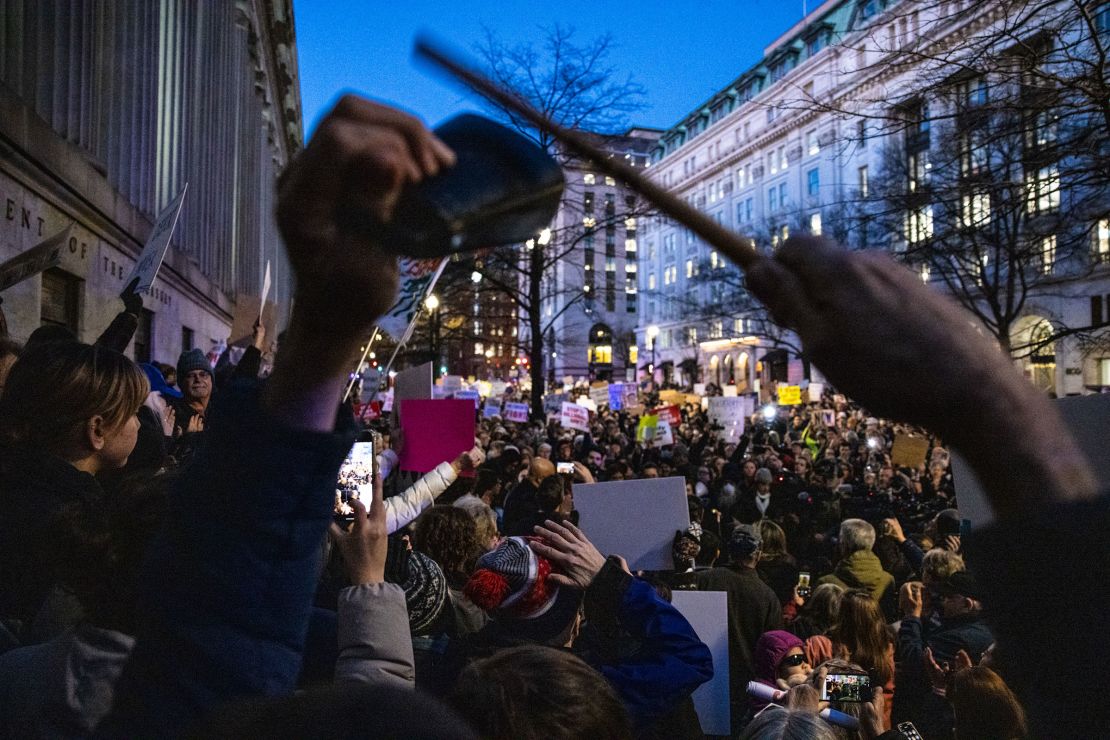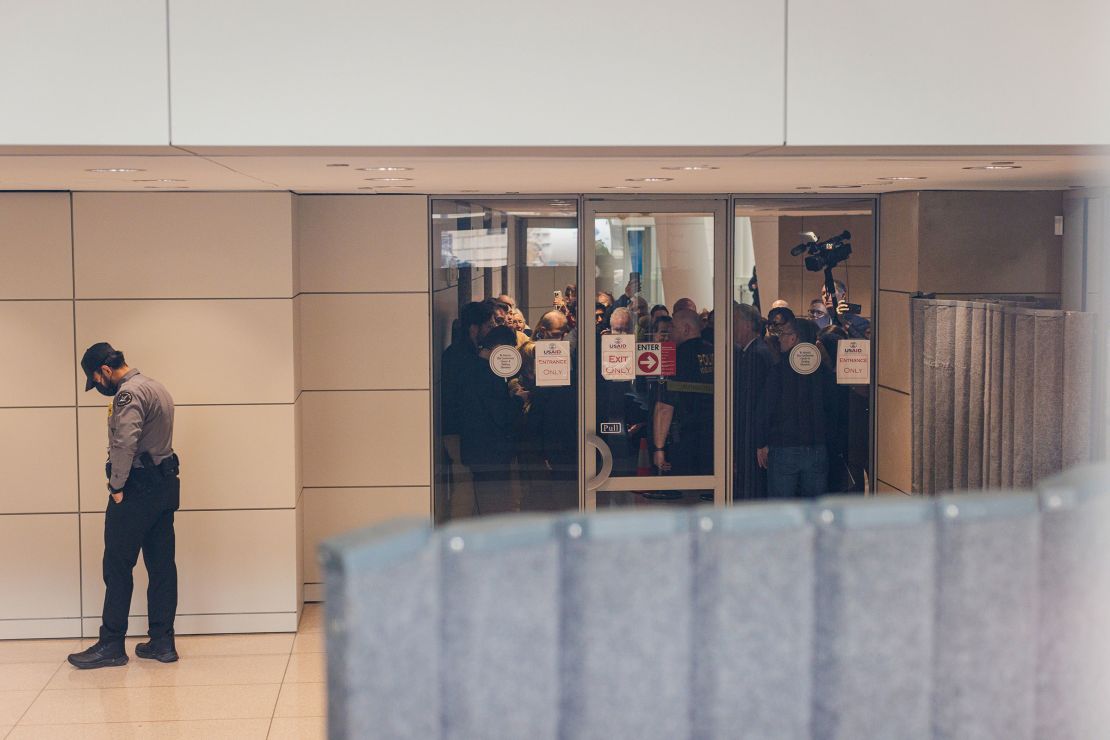As the Trump administration fires thousands of employees across the government, federal workers have another reason to be on edge: the widespread access that Elon Musk’s “government efficiency” team has gained to agency computer systems.
The sudden appearance of DOGE representatives at agencies across Washington and the Trump administration’s search for federal employees it deems disloyal to the president have created a wave of anxiety among feds that their emails, texts or conversations could be monitored.
Some government employees are now turning off their phones at home. Others are opting for in-person chats at work rather than over Microsoft Teams. Some have even gone so far as to buy special Faraday bags, designed to block electromagnetic signals, in order to thwart any potential snooping. A few are printing out their employee records, including performance reviews, just in case they are deleted or altered in the federal systems.
Their concern is that, with a president who talks openly of retribution against his opponents, even the most mundane of comments might be taken out of context to paint someone as anti-Trump.
“I used to carry my work phone around with me everywhere, after hours, on the weekend, in case anything was needed. Now I won’t take it out of my office space,” said one employee at the General Services Administration (GSA), the government procurement agency.
CNN spoke to more than a dozen federal employees at more than five federal agencies who conveyed a sense of fear and paranoia, not just about the increased potential of losing their job, but also about being surveilled without their knowledge.

It’s unclear to what extent government practices for monitoring employees have actually changed under the second Trump administration. Many programs to use both software and people to detect “insider threats,” or unauthorized access to information, ramped up during the Obama administration after the leak of government secrets by former intelligence contractor Edward Snowden.
“DOGE is fulfilling President Trump’s commitment to making government more accountable, efficient, and, most importantly, restoring proper stewardship of the American taxpayer’s hard-earned dollars,” a White House official said in an emailed statement. The official did not respond when CNN asked whether the administration has changed any policies or practices for monitoring federal employees’ communication.
“Those leading this mission with Elon Musk are doing so in full compliance with federal law, appropriate security clearances, and as employees of the relevant agencies, not as outside advisors or entities,” the White House official said.
But rumors have been rampant among federal workers that their online chats in programs like Microsoft Teams are being monitored by more senior officials. And those rumors are already changing behaviors.
“Does the truth matter, if everyone believes it?” said another federal worker. “Obviously, legally it does, but from a psychological perspective, if what they want is to scare people, then they might already be winning.”

That Musk’s Department of Government Efficiency reports to the White House chief of staff has only heightened concerns.
The GSA sought to dispel such rumors last week, issuing a statement that the agency “has no plans to surveil employees.”
For some federal workers, their suspicions of surveillance are hard to shake. “There is a persistent feeling that we are being watched,” one Department of Veteran Affairs employee told CNN.
As a result, the VA employee has stopped using their work computer to look at news websites during their lunch break and is even wary of using their personal phone in the office when it’s connected to WiFi. They’ve thought about covering up the camera on their computer to avoid being watched, and they walk to the other side of the office — away from their computer — and speak quietly if they have to say anything that could be considered critical of the current administration.
Asked if they think they are being recorded in the office, the VA employee said, “It’s very unlikely, but is it impossible? No … I mean, did you ever think that a 19-year-old named Big Balls would be accessing information at the State Department?”
The tech savviness of Elon Musk and his DOGE team has also heightened concerns at the Department of Education, said one employee there. “Any technical glitch we experience, we wonder, is this just us being paranoid or is it some nefarious action?”
DOGE has six people at the Department of Education who are all federal employees, according to a court filing in a lawsuit brought by student association challenging DOGE’s access at the department. The six people have accessed department IT systems related to student loan programs as part of an audit for waste, fraud and abuse, the court filing says.

Some State Department employees have been informed by their superiors that DOGE may have “deep reach” into department systems, a source familiar with the situation told CNN. Multiple department employees received a notice on their mobile phone while at work telling them: “Your organization installed a certificate authority in your work profile. Your secure network traffic may be monitored or modified,” according to a screenshot of the message shared with CNN.
State Department employees sometimes have the option to access specific department applications from their personal mobile devices, a State Department spokesperson told CNN.
“Enrollment of personal mobile devices to this program is strictly voluntary,” the spokesperson said in an emailed statement two days after this story published. “There have not been any significant, recent changes to these policies and processes.”
One federal employee in Nevada is now more careful about the terms they use in Microsoft Teams messages at work. “I try not to say words that might stand out if you were running a language model to find words,” they said, referencing artificial intelligence.
At the National Oceanic and Atmospheric Administration, scientists no longer take meeting notes in Google Docs, an employee told CNN. Instead, their leaders have urged them to use offline programs, such as Microsoft Word, and then post online a “clean version” without any terms that might trigger a closer look, like “climate change.”
“People are picking up the phone for the first time in a decade because they don’t have to have online meetings or notes,” the employee told CNN. “We’re that level of paranoid.”
This story has been updated with additional reaction.
CNN’s Katie Bo Lillis and Jennifer Hansler contributed to this report.







